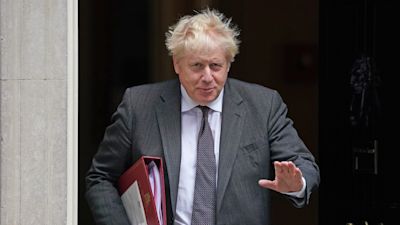Insight
Will we thank Boris Johnson for muddling through on Omicron?

The political and economic new year is all about surging Covid and a surging cost of living. The list of what families in particular will contend with in the coming weeks is enough to induce tears of exasperation.
Take schools for starters.
Staff absences, largely caused by coronavirus, were 8% at the end of last term. On the Department for Education's own projections, the Omicron surge means these absences will rise to between 9% and 13% at the beginning of this term, and it is not inconceivable the upward path in absences will peak at between 20% and 25%.
The Education Secretary, Nadhim Zahawi, is determined schools should remain open. Head teachers are with him in the ambition but are understandably anxious about the challenge - which will be trebly hard for remoter schools located far from supply teachers.
Damage to education is inevitable, as Zahawi has admitted, in the permissions he's granted for classes to be merged and for assistants to fill in as teachers.
And don't forget large numbers of students will be off sick too, since - as of 19 December - only 50.3% of 12 to 15 year olds had been vaccinated at all. Children have the lowest rate of Covid-19 immunity in the UK, by a margin.
If I were 16 or 18, I would be anxious about the prospect of taking exams as normal this summer. It wouldn't seem fair or reasonable. As a parent, my stress levels would be off the charts.
The health service corollary is weeks of pressure on hospitals and NHS more generally, from staff absences and the inexorable rise in hospital admissions.
Hooray that relatively fewer people are dying of Covid or are acutely ill. But when hospitals fear that they will struggle to treat those with cancer or heart conditions or suffering strokes or who have suffered an accident - because there are too few fit staff and hospital beds are full - and when large numbers of planned non-urgent treatments are cancelled, the indirect cost of raging Omicron is huge.
As the chief executive of NHS Providers Chris Hopson has said this morning, "a number of trusts across the country have declared internal critical incidents over the last few days" - because they fear they "might not be able to supply the [needed] range of critical/priority services".
How bad it gets will depend on whether Christmas and new year festivities will increase the momentum of Omicron's onslaught, and on whether the rate of infection in more vulnerable older age groups can be kept at current relatively low levels.
It's encouraging that hospitals in London - the early Omicron epicentre - have coped well. But it can't be taken for granted that infections in the capital will start to fall to any meaningful extent.
I'll return to the cost of living crisis in more detail in coming days, because I am conscious that it's sadistic of me to drown you in difficult news.
But it's worth pointing out the flaw in Boris Johnson's argument that refusing further Covid restrictions in England - resisting the limits on social interaction imposed in the rest of the UK - is for the good of the economy.
Massive staff absences don't just hurt schools and hospitals but impair the ability of all employers to carry on as usual. And when they also lead to unplanned cuts in the supply of goods and services, they reduce income AND they're potentially inflationary.
They further squeeze our living standards, reinforcing the likely pressure from Brexit bureaucracy at the borders that was ushered in on 1 January.
As is characteristic of Boris Johnson and his government, there's been no cost-benefit analysis of the merits of his light touch response to the Omicron onslaught versus more paternalistic restrictions.
Urged on by the libertarian wing of his party, he's followed his gut that we'll thank him for muddling through. We might not.
Coronavirus: What you need to know